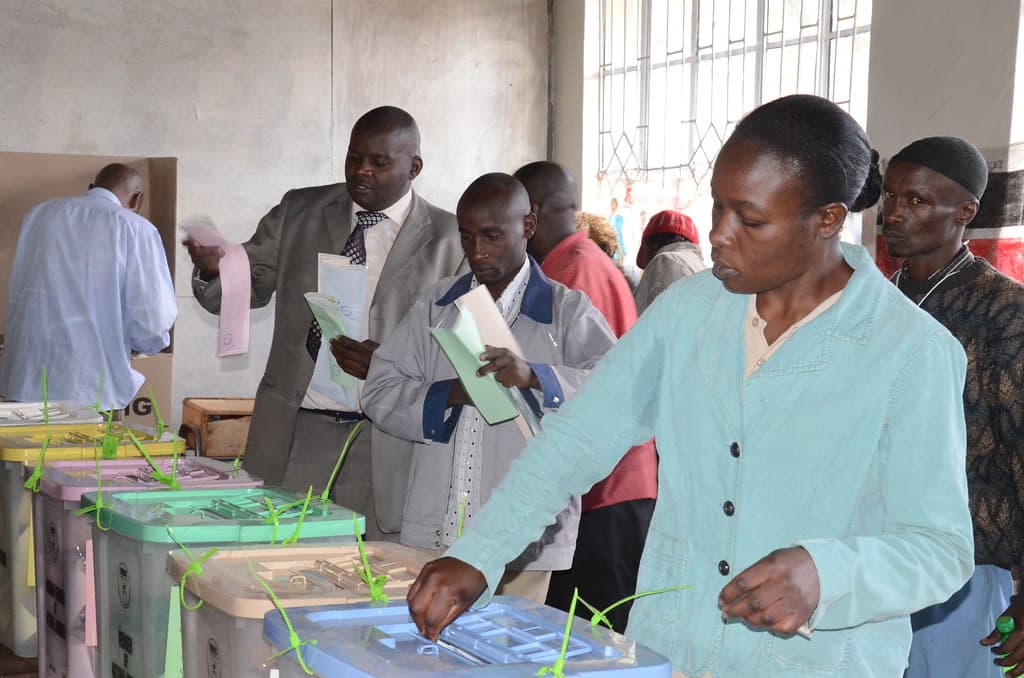We're loading the full news article for you. This includes the article content, images, author information, and related articles.
A recent national survey by Trends & Insights for Africa (TIFA) has revealed that the public’s two biggest concerns about the 2027 general election are government or political interference and lack of trust in the Independent Electoral and Boundaries Commission (IEBC).

Nairobi, Kenya — September 24, 2025, 09:30 EAT.
A recent national survey by Trends & Insights for Africa (TIFA) has revealed that the public’s two biggest concerns about the 2027 general election are government or political interference and lack of trust in the Independent Electoral and Boundaries Commission (IEBC). Among respondents expressing no confidence in the electoral process, 45 percent cited political interference, while 34 percent blamed distrust in IEBC itself.
Of Kenyans who said they have no confidence at all in the integrity of the 2027 polls, 45 percent attributed their skepticism to political meddling and corruption, while 34 percent pointed to institutional distrust in IEBC.
Only 18 percent of those surveyed said they are “very confident” in IEBC, while 26 percent said they are “somewhat confident.”
The poll was conducted between August 23 and September 3, 2025, covering 2,024 adults across all 47 counties. Margin of error is ±2.17 percent.
The poll suggests that even with recent changes in IEBC leadership, public confidence remains low.
These findings mirror earlier surveys: in May 2025, TIFA reported that about half of Kenyans expressed no confidence in the upcoming elections, citing political interference as a leading cause.
The doubts reflect deeper institutional and governance anxieties, including past controversies over vote tallying, boundary reviews, and previous election disputes.
The credibility of Kenya’s elections is constitutionally anchored in IEBC’s independence, the transparency of the results transmission system, and accountability mechanisms (e.g. judicial review).
For the 2027 election, IEBC must meet several legal deadlines—such as boundary review completion, voter registration, and procurement of election technology—any slippage can fuel skepticism.
Confidence can further be affected by how political actors respect electoral rules, avoid undue influence, and accept outcomes.
TIFA Analysts / Survey Team: Emphasised that these results signal a trust crisis that the IEBC and government must confront head-on before 2027.
Civic Groups / Observers: Likely to call for reforms around IEBC capacity, transparency in processes (like tendering election hardware), and mechanisms to shield the commission from political influence.
Political Actors: Ruling and opposition parties may use the findings either to argue for institutional reforms or to delegitimise outcomes they expect to lose.
Public / Voters: The results reflect widespread unease; many Kenyans may demand direct participation, oversight or alternatives to bolster faith in the process.
|
Metric |
Value |
|---|---|
|
Survey period |
August 23 – September 3, 2025 |
|
Sample size |
2,024 Kenyan adults |
|
% “no confidence at all” citing political interference |
45 % |
|
% “no confidence at all” citing distrust in IEBC |
34 % |
Erosion of legitimacy: If a large portion of the population believes the process is rigged, election outcomes—regardless of technical correctness—may lack acceptance.
Increased tensions: Political actors may escalate conflicts (court cases, protests) over disputed results, especially in closely contested races.
Institutional pressure: IEBC will come under intense public, media, and donor scrutiny to prove its neutrality, transparency and competence.
Reform demands: The survey may increase pressure for structural reforms—e.g. stronger oversight, independent auditing of election tech, legislative checks on interference.
Whether IEBC or the government will respond with reforms robust enough to shift public perception.
Which segments (regions, age groups, party supporters) show the strongest distrust and how that shapes electoral strategy.
The degree to which the concerns overlap: is distrust in IEBC seen as a result of political interference, or a distinct issue?
Whether the perception gap changes as 2027 draws nearer and as IEBC implements or fails to implement reforms.
Aug 23 – Sept 3, 2025: TIFA conducts national survey.
Sept 24, 2025: Survey findings published / reported in media.
IEBC’s public communication, structural changes (e.g. procurement, transparency measures).
Legislative or policy proposals aimed at safeguarding IEBC’s independence (e.g. removal of political appointments, audit checks).
Civil society and media campaigns to hold IEBC and executive actors accountable.
Subsequent polls to track whether public confidence improves or deteriorates closer to elections.
Keep the conversation in one place—threads here stay linked to the story and in the forums.
Sign in to start a discussion
Start a conversation about this story and keep it linked here.
Other hot threads
E-sports and Gaming Community in Kenya
Active 9 months ago
The Role of Technology in Modern Agriculture (AgriTech)
Active 9 months ago
Popular Recreational Activities Across Counties
Active 9 months ago
Investing in Youth Sports Development Programs
Active 9 months ago